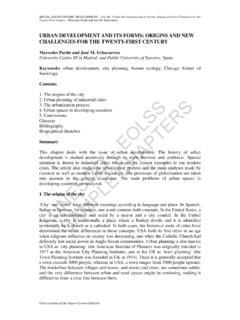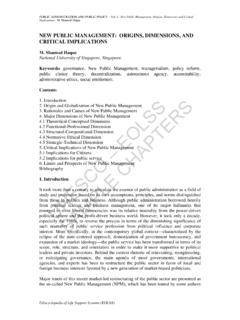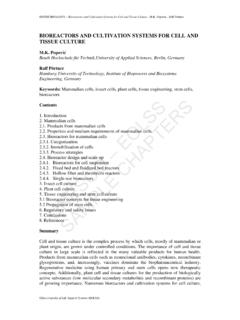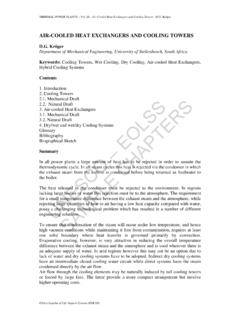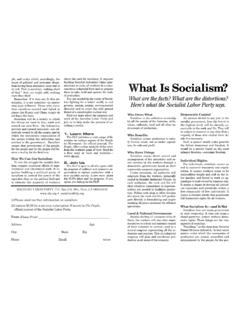Transcription of Socialism and Communism
1 GOVERNMENT AND POLITICS Vol. II - Socialism and Communism - D. W. Lovell Socialism AND Communism D. W. Lovell School of Politics, University College, University of New South Wales, Australia Keywords: Capitalism, Civil society, Communism , Community, Economic management, Equality, Freedom, Lenin, Marx, Social democracy, Socialism . Contents 1. Introduction 2. The Early History of Socialism and Communism 3. The Role of Karl Marx 4. The Role of Lenin 5. The Critique of Capitalism 6. Methods and Values 7. The Collapse of Communism 8. The Future of Socialism 9. Conclusions Acknowledgments Bibliography Biographical Sketch Summary Socialism and Communism are two sets of ideas (inspiring movements for social, political and economic change) that significantly overlap. Since the 1830s, when Socialism first appeared as a response to the social question, the older term Communism has been used by some socialists to identify particular currents and groups that are nevertheless within the same general tradition.
2 In this article, Socialism will be used as the generic term, for this tradition is dedicated to the vision of a good society characterized by social solidarity. Whereas pre-socialist Communism advocated more equal distribution on ethical grounds, Socialism assails inequities in its campaign against capitalism but believes that the issue will become redundant once industry is organized rationally to fulfill people s (unequal) needs. Thus Socialism looks to the potential of industry to solve the problems not just of poverty, but also of need itself. Socialism has been dominated by Marx s theory, which brought to it an agency, the proletariat, a sense of historical destiny based on the ineluctable growth of the productive forces, and a critique of capitalism grounded in its own, political-economic terms.
3 Communist rule, originating in Russia in 1917, brought a type of Marxism to the forefront; yet it also divided the socialist movement into those who sought to overthrow the capitalist state, and those who thought it could be reformed. The political and economic records of the communist states, but especially their disingenuousness and falsifications, have dealt a blow to the credibility of all socialists. With the recent collapse of Communism socialists have begun the search for a better theoretical grounding for their continuing concerns about poverty, inequality and excessive individualism; but no overarching theory is in prospect. Indeed, the rise of post- Encyclopedia of Life Support Systems (EOLSS) 74 GOVERNMENT AND POLITICS Vol. II - Socialism and Communism - D. W. Lovell industrial society suggests that the dominant Marxism was a historical detour for Socialism , and invites a reappraisal of the deep-rooted ethical strands within Socialism .
4 1. Introduction It is difficult to define precisely the meanings of the concepts of Socialism and Communism . Discussing ideas in their historical context and development presents problems different from those in the more abstract realm of philosophy. When certain ideas have been at the center of long development and even of heated dispute, it is especially difficult to be definitive. If we are too prescriptive, we risk defining most socialists out of their own tradition; if we try to be all encompassing, we risk being unable to distinguish socialists from other traditions in political and social thought. The disputes surrounding Socialism and Communism have involved not just those who are thoroughly opposed to these ideas, but somewhat distressingly for many socialists themselves, and for others who seek clarity in this area those who are part of the socialist movement itself.
5 The fractious nature of Socialism was evident from its beginnings in the 1830s. The most famous and influential statement of the socialist mission the Communist Manifesto of 1848, written by Karl Marx with the assistance of Frederick Engels was also a withering critique of competing socialisms, and added a further complication by using Communism (a much older term) to describe the radical wing of Socialism . But a concept or idea is not owned or controlled by anyone, however much we associate one person with it. As a consequence of their moving from person to person, across time and national boundaries, the understandings of concepts are altered: sometimes almost imperceptibly, sometimes drastically. The ideas of founders are supplemented, or used in different contexts, even as the authority of the founder is invoked.
6 If dead or remote, the founder is unable to judge disciples from epigones. Marx himself lived long enough to say, in connection with the enthusiasm of some French followers, that he was not a Marxist. Such is the broader story of Socialism , even within its relatively brief career. The bitterness of its internal disputes, and its readiness to brand renegades and traitors, have often overshadowed its case (and its campaign) against capitalism. Attempts to evoke the unity and diversity of Socialism have relied heavily on metaphor. One approach has been to imagine Socialism as a royal family with lineal successors inheriting the crown of ideological authority. This has been characteristic of many communists, all of whom begin the line with Marx and continue it with Lenin, but divide (according to their particular affiliations) on whether it should go on to Joseph Stalin, Khrushchev, and later Soviet leaders, or to Stalin, Mao Zedong, and other Chinese leaders, or to Leon Trotsky, or dissident communist leaders.
7 This royal or apostolic succession seeks to establish, or reaffirm, the legitimacy of some, and deny it to others. Other approaches are less exclusive. The tree of Socialism , for example, has its roots in the pre-Marxists (notably Charles Fourier, the Comte de Saint-Simon, and Robert Owen), the trunk in Marx (and his redoubtable colleague Engels), and then a profusion of branches indicating the Social Democrats, Communists, Fabians, anarcho-syndicalists, and other post-Marxists. Socialism is seen by others as a broad river which contains many different currents, some of which mingle at their edges or more substantially. From a distance, the river seems to be a continuous flow in one direction; Encyclopedia of Life Support Systems (EOLSS) 75 GOVERNMENT AND POLITICS Vol. II - Socialism and Communism - D. W. Lovell upon closer inspection, the various currents and eddies assume more significance.
8 The currents themselves may be conceived as the isms which have been associated with particular groups of socialists, such as Marxism, Leninism, Revisionism, Fabianism, Anarchism, and so on; or they may be conceived as the different themes and values to which socialists have addressed themselves. Last, but in some respects the most useful metaphor, is Socialism as a family: a group which shares certain characteristics, but no two members of which may share the same characteristics. And we are surely all aware of the tensions within families! However we envisage Socialism , these metaphors serve to remind us of its complex and developing nature. A useful way to begin an examination of Socialism s range of meanings, therefore, is to outline its historical development. We can then attempt to identify and organize the concerns that make Socialism distinct.
9 2. The Early History of Socialism and Communism Socialism and Communism are different concepts, but the movements inspired by them have developed in parallel during the last 170 years as a result of common opposition to capitalism. Their core differences may be summed up by saying that the abolition of private ownership to produce equitable distribution was the central prescription of pre-nineteenth century Communism , while conscious and rational organization of economic activity as a basis for abundance (thus transcending the question of distribution) is the major prescription of Socialism . This contrast between early Communism s focus on distribution, and Socialism s focus on production, provides a framework for considering their historical development and modern affinity. Communism is an ancient idea centered on the common ownership of goods.
10 It is first recorded in ancient Greek thought, most notably in Plato s exegesis of the good society The Republic written 2500 years ago. Later some of the early Christian communities, believing in the imminent return of Christ and the creation of the kingdom of heaven on earth, actually held their goods in common. Thereafter, the idea of Communism finds episodic published expression in such works as Thomas More s Utopia (1516), works by Gabriel Bonnot de Mably, and Morelly s Code of Nature (1755), though we may assume that it had a less articulate life in popular discontent and musings. Its chief inspiration is moral: the abandonment of private ownership of goods and property was thought to give rise to social harmony, as people ceased putting their private interest above the collective good. It has consequently appeared in many different types of productive system.


